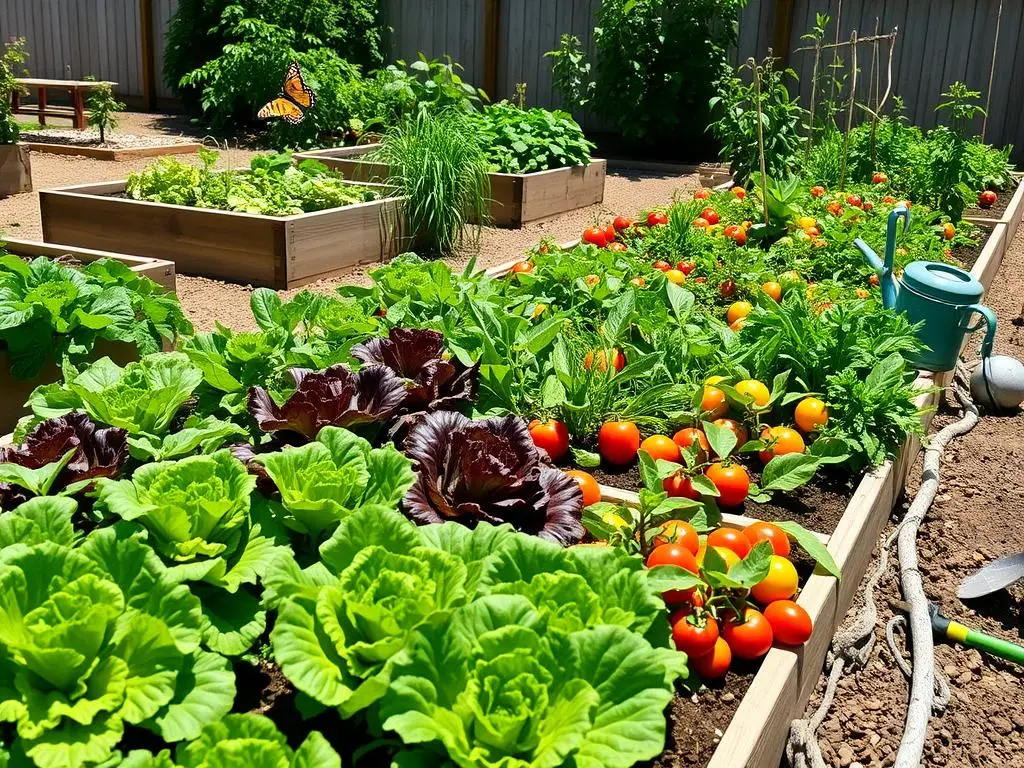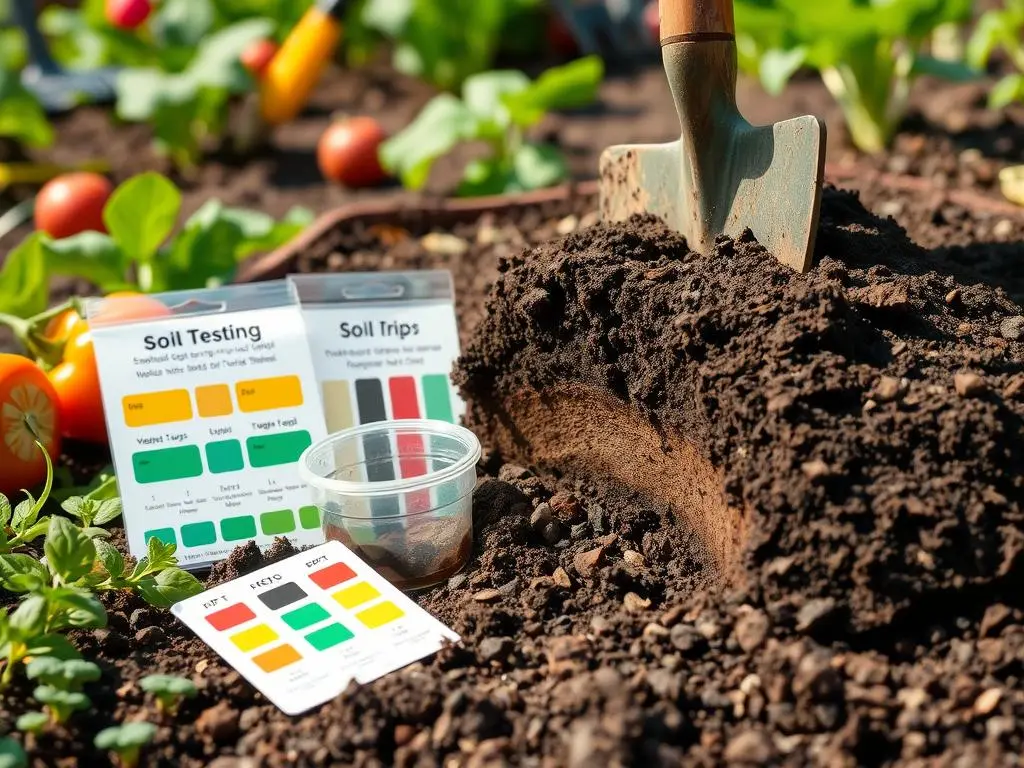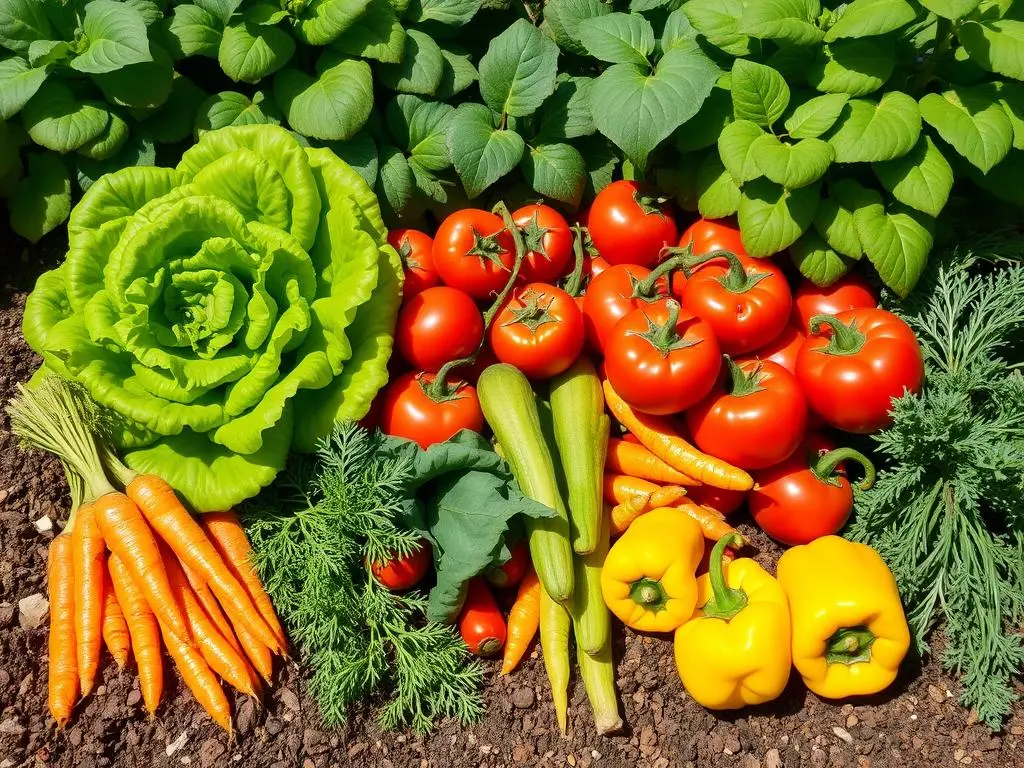How to Start Your Own Vegetable Garden at Home
Did you know growing your own veggies can cut your grocery bills by up to $600 a year? In addition to this, starting a vegetable garden at home is rewarding and gives you fresh, healthy food right in your yard. It’s great for both experienced gardeners and beginners. Consequently, this guide Vegetable Garden Tips & Tricks will show you how to start your own vegetable garden. We’ll cover planning, picking the right crops, and keeping your garden healthy. At the end, you’ll know how to turn a small part of your yard into a garden full of fresh produce.

Key Takeaways: Vegetable Garden Tips & Tricks
- Growing your own vegetables can save you hundreds of dollars on grocery bills each year.
- Starting a home vegetable garden is a rewarding and satisfying experience.
- This guide will walk you through the essential steps to create a thriving vegetable garden.
- Learn how to plan the layout, choose the right crops, and maintain a healthy growing space.
- Transform a small section of your yard into a bountiful oasis of homegrown produce.
Essential Planning and Location Selection for Your Vegetable Garden
Starting your vegetable garden needs careful planning. You must think about sunlight, space, and your local climate. This ensures your garden grows well and gives you a lot of food.
Assessing Sunlight Requirements
Sunlight is key for a successful vegetable garden. Most importantly, most plants need at least 6 hours of direct sunlight a day. Furthermore, some need even more. Check how much sunlight your garden spot gets to find the best place for your plants.
Measuring Available Space
The size of your garden depends on how much space you have. Measure your area well to fit all your veggies and layout. Think about paths, raised beds, or containers to use every inch of space.
Understanding Local Climate Zones
Knowing your local climate zone is crucial. Indeed, it helps you pick the right veggies and when to plant them. Look up your area’s temperatures, rainfall, and frost dates to make a garden that grows well in your climate.
By thinking about these important factors, you’re ready to plan a great vegetable garden. It will meet your needs and be productive.
Soil Preparation and Testing Methods
Getting your soil ready is key to a great vegetable garden at home. The health of your soil affects how well your plants grow. It’s important to know about soil pH, nutrients, and how to make it better.
Soil pH is crucial. Most veggies like a pH between 6.0 and 7.0. You can test your soil’s pH with a simple kit from a garden store or online. In fact, this tells you if your soil is too acidic or alkaline, thus helping you adjust it.
Now, let’s talk about soil nutrients. Your soil needs nitrogen, phosphorus, and potassium to help plants grow. You can test your soil at an agricultural extension or a lab to see what nutrients it lacks.
To make your soil better, think about adding compost and soil amendments. Compost adds organic matter and good microbes to your soil. It makes your soil better for plants. You can make compost at home or buy it from a supplier.
- Test your soil’s pH and nutrient levels to determine its needs
- Add compost and other organic soil amendments to improve soil structure and fertility
- Consider using a balanced fertilizer to supplement your soil’s nutrient content
By preparing and testing your soil well, you set up your garden for success. You’ll get lots of delicious veggies. Happy gardening!

Vegetable Garden, planting vegetables, how to start a vegetable garden
Starting your own vegetable garden is very rewarding. It lets you grow your own fresh, healthy food. Indeed, whether you’re new to gardening or want to grow more, knowing how to plant vegetables is crucial.
Easy Vegetables for Beginner Gardeners: Tips & Tricks
Begin with easy vegetables for beginners. Good choices include tomatoes, zucchini, green beans, lettuce, and radishes. These plants are simple to care for and grow well, giving you a sense of pride.
Seasonal Planting Guide
Planting at the right time is important. To start with, use a planting calendar for your area to plant crops when they grow best. This way, your garden will be productive all year, giving you fresh veggies.
The Benefits of Companion Planting
Companion planting makes your garden healthier and more productive. It involves placing plants together to help each other. For example, marigolds near tomatoes keep pests away, and leafy greens and root veggies use space well. In addition to this, these combinations can also help to improve overall garden health and productivity. Learning about companion planting can make your garden better and more eco-friendly.

Garden Tools and Equipment You’ll Need for vegetable garden
Starting your vegetable garden needs the right tools and equipment. Whether you’re experienced or new, the right tools are key to success. Let’s look at the essential tools and supplies for your garden.
Fundamental Gardening Tools
Every vegetable garden starts with a few basic tools. You’ll need a strong garden trowel for planting and moving plants. Also, a good hand cultivator for digging into the soil. And don’t forget garden gloves to keep your hands safe.
Specialty Gardening Equipment
As your garden expands, you might need more specific tools. Indeed, a garden hoe is great for weeding. Moreover, a garden fork is essential for mixing and aerating the soil. Furthermore, a garden sprayer is handy for watering plants with fertilizers or pest control.
Watering Essentials
Indeed, watering is vital for your garden’s health. A watering can or a garden hose with a nozzle helps water your plants right. Furthermore, having the right tools and equipment is crucial for your garden. With these essentials, you’re set for a successful and lush vegetable garden.
Watering Systems and Irrigation Solutions
Indeed, keeping a vegetable garden healthy needs a smart watering plan. In the first place, there are many ways to do this, like using drip irrigation systems. Moreover, these systems send water right to the roots, not only saving water but also helping plants grow well.
Drip Irrigation Setup
Installing a drip irrigation system can change your garden game. It waters plants slowly and evenly, avoiding too much water. You’ll need to lay out flexible tubing and emitters in your garden beds.
By adjusting where and how much water each emitter gives out, you can make sure your plants get just the right amount of moisture.
Water Conservation Tips
There are more ways to save water in your garden. Mulching keeps the soil moist, and grouping plants by their water needs can cut down on water use. Also, fixing any leaks in your irrigation system helps save water.
Proper Watering Schedules
To start with, having a regular watering schedule is key for your garden’s health. In fact, how often and how long you water depends on the weather, soil, and what your plants need. It’s best to water deeply but not too often, letting the soil dry a bit between watering.
Moreover, this helps plants grow strong roots and avoids problems like fungal diseases or weak roots.
Furthermore, using these irrigation and water-saving tips can make your garden thrive while using less water. As a result, with some planning and effort, you can have a beautiful, productive garden that’s also good for the planet.
Natural Pest Control and Garden Maintenance
In the first place, keeping a vegetable garden healthy is more than just planting and watering. Not to mention, we must tackle pests and weeds to keep our garden thriving. Moreover, Organic pest control and sustainable gardening help our vegetables grow strong without harsh chemicals.
Additionally, encouraging beneficial insects is a key part of organic pest control. Ladybugs, lacewings, and praying mantises eat pests like aphids and caterpillars. To say nothing of, we attract these helpers by planting flowers that offer them food and shelter.
Furthermore, regular garden upkeep is also vital for a healthy garden. Weeding, mulching, and pruning are important tasks. As a matter of fact, these help prevent weeds from stealing nutrients and water from our vegetables. They also keep our plants healthy and strong.
FAQ
What are the benefits of starting a vegetable garden at home?
Starting a vegetable garden at home has many benefits. You get to enjoy fresh, nutritious food right from your garden. It’s also rewarding to grow your own food and enjoy the outdoors.
By gardening at home, you can taste the difference of homegrown produce. It’s also better for the environment and supports sustainable living.
How do I choose the right location for my vegetable garden?
Choosing the right spot for your garden is important. Look for areas with plenty of sunlight and enough space. Also, consider your local climate and growing season.
This helps ensure your plants get the best conditions to grow.
What steps should I take to prepare the soil for my vegetable garden?
Soil preparation is key for a healthy garden. First, test the soil’s pH and nutrient levels. Then, add organic matter like compost to improve it.
This creates a great environment for your plants to grow and thrive.
Which vegetables are best for beginner gardeners?
Beginners should start with easy-to-grow veggies like tomatoes, zucchini, and bell peppers. Radishes and leafy greens like lettuce and spinach are also great choices.
These plants are hardy, need little care, and produce lots of food.
What kind of tools and equipment do I need to start a vegetable garden?
You’ll need basic tools like a trowel, gloves, and a watering can. A garden hoe and pruning shears are also important.
For a bigger garden, consider a garden fork, soil test kit, and other specialized tools like a drip irrigation system or compost bin.
How can I effectively water and maintain my vegetable garden?
Watering and maintenance are crucial for a healthy garden. Use a drip irrigation system to save water and reduce waste.
Water regularly, adjusting for weather and plant needs. Remove weeds, mulch, and use sustainable gardening practices to keep your garden in top shape.
What are some natural methods for controlling pests in my vegetable garden?
To fight pests without harsh chemicals, try natural methods. Introduce beneficial insects and use row covers or botanical pesticides.
Regularly check your garden for pests and act quickly to prevent problems.



